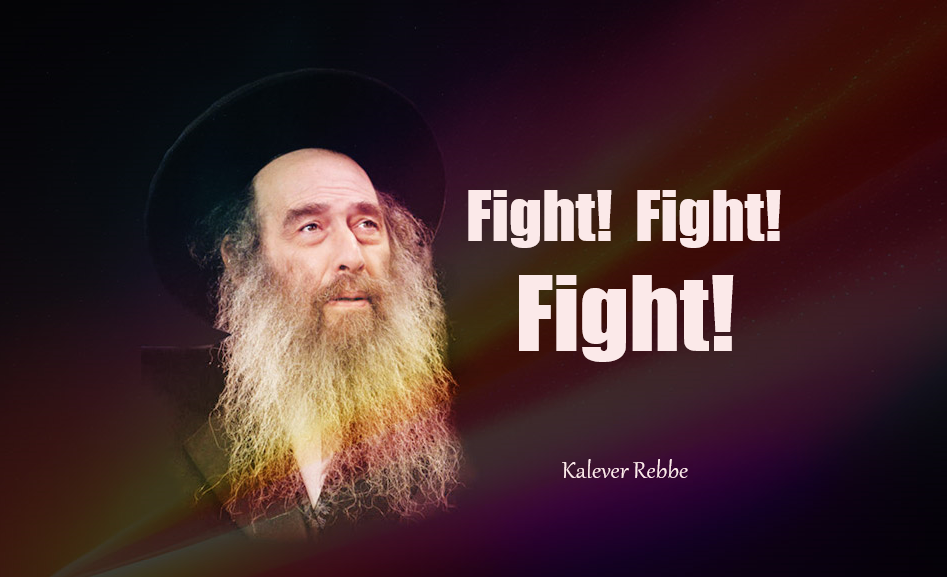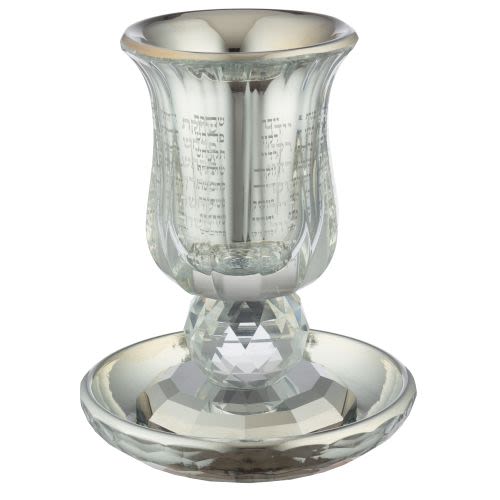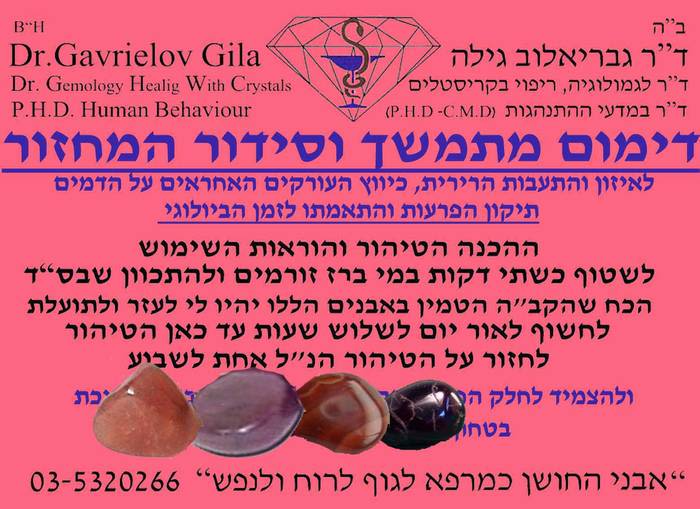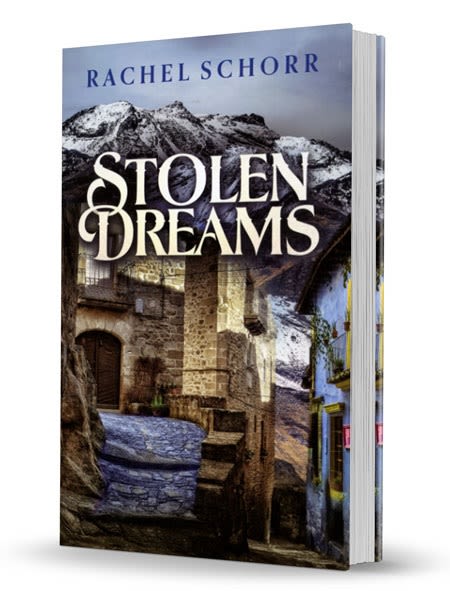
Killing One’s Evil Inclination
Life’s greatest test lies in overcoming our lower desires. It is the principle reason for the soul’s descent into the body. Success in this realm...

Life’s greatest test lies in overcoming our lower desires. It is the principle reason for the soul’s descent into the body. Success in this realm is the gateway to holiness. But the only way…
One of the central pillars of chassidic thought is the concept that every bad character trait can be used for a good purpose. The great Rav Tzaddok HaKohen of Lublin explains that evil inclination can only be overcome by using it in a positive way. Thus, the propensity to murder should be redirected inwardly, namely, to kill one’s immoral desires for the sake of God. “What can a person do and live?” asks the Talmud, “Let him kill himself in the study of Torah” (Tomid 32a).
This fierce disposition, indispensable for overcoming one’s evil inclination, can nonetheless be used improperly. Yaakov (Jacob) cursed this trait in his sons: “Shimon and Levi are brothers…Cursed be their anger, for it was vehement, and their wrath, for it was cruel. I will divide them in Yaakov, and scatter them in Israel” (Bereishit 49:5, 7). And yet the tribe of Levi transformed this negative inclination into a positive one: “They observed Your word, and kept Your Covenant” (Devarim 33:9). It was their conviction to guard their spiritual purity that saved them form the contamination of Egypt and, during the forty years of desert wanderings, they continuously risked their lives for the sake of fulfilling God’s will (Only the tribe of Levi circumcised their sons in the desert. Circumcision is a sign of spiritual purity and the subjugation of man’s lower desires. See Rashi on Deuteronomy 33:9).
The tribe of Levi directed their anger against the evil inclination: as a group, in their refusal to worship the golden calf and, as individuals, as in Pinchas’ zealousness to eradicate the immorality that occurred with the women of Midian. Yaakov’s curse did not apply to them; instead, they were worthy of Moshe’s blessing: “Bless, Lord, his strength, and accept the work of his hands. Smite though the loins of them that rise against him, and of them that hate him, that they not rise again” (ibid 33:11). Some rose even higher and merited priesthood, as it says: “They shall teach Yaakov Your judgments and Israel your law” (ibid. 33:10). In addition, many prophets were Kohanim: Yermiyahu (Jeremiah) and Yechezkel (Ezekiel) among others. Yet no king or judge over came from the tribe of Shimon, for they fell into immorality, as the Torah accounts in the episode with Zimri (See Yalkut Shimoni, Shofetim 42).
Yaakov said about Shimon and Levi: “I will divide them in Yaakov, and scatter them in Israel”. For Shimon, this meant that his descendants would be teachers, scribes and beggars, forced to wander the Land of Israel looking for work. Whereas for Levi, these words were fulfilled by his descendants traveling the Land to receive the priestly gifts of terumah, ma’aser and matnos Kehunah (Rashi on Bereishit 49:7).
Even though it was destined that all the tribes would one day be referred to by the name of Yehudah (Jews), as the verse says, “Yehudah, your brothers will praise you” (Bereishit 49:8), nonetheless, the tribe of Levi still retains its original name, Kohanim and Levi’im as a sign of honor and praise (Bereshit Rabbah 98:11).
Protection From Above
It is known that God’s holy Name, Shadai, rests upon those individuals who overcome their evil inclination; it destroys all the harmful forces that would attack them. (The Name Shadai corresponds to the Sefirah of Yesod. See Sha’arei Orah, sha’ar 2; Etz Chaim, Sha’ar 4; Sha’ar Ma’amarei Chazal, essay entitled “The footsteps of Avraham Avinu”). Rabbi Tanchuma bar Chanilai said ”Whoever is discreet in marital relations is saved from destructive forces” (Brochot 62a). Likewise, the Tikuney Zohar says: “A person who overcomes his desires is guarded from his enemies by God, as the verse states: ‘In the shadow of Shadai he will rest’” (Tehillim 91:1) (Tikuney Zohar 21; Likutey Moharan I:31).
God will even alter the course of nature for such a person. For example, the sun and moon stood still over the valley of Gibeon in order for Yehoshua (Joshua) to defeat his enemies (Yehoshua 10:12-14). "Do my will," he told them, "for you belong to my grandfather Yosef. Did he not see in his dream that the sun, moon and the eleven stars bowed down to him? You too must stand still before me!” The eleven stars that bowed down to Yosef (Josef) the Tzaddik in his dream represent the eleven constellations that are subservient to those who overcome their evil inclination, as did Yosef (Bereshit Rabbah 84:10. The twelve constellations correspond to the twelve tribes; Midrash T’Desha, chapter 10; Tanna d’Bei Eliyahu, chapter 5. In Likutey Mohoran I:36, Rabbi Nachman explains that maintaining one’s spiritual purity gives shape for blessings to descend into the world).
True Life
A person who has freed himself of his lower desires is called “a living man” (On the verse, “And Benyahu ben Yehoyada, the son of a living man” [II Samuel 23:20], the Talmud comments: Even in death, tzaddikim are called alive [Brochot 18a]. Likewise, the Sefirah of Yesod is called Chayei Olamim – the Life of the Worlds; Zohar 1:211a). This is the meaning of “Yaakov, our forefather, did not die,” for he totally subjugated his lower nature (Ta’anit 5b; Zohar I:235b). The same was true of Rabbi Yehudah HaNasi, whose soul came from that of Yaakov (Sefer HaGilgulim, chapter 41; Likutey HasShas, Chapter 2). The word HaNasi –prince- is an acronym for the words, “A spark of Yaakov, our father.” (הוא ניצוץ של יעקב אבינו) He therefore merited the title Rabbeinu HaKodesh-our holy Rabbi –even in the generation of the Tannaim, one of the most exalted in Jewish history.
The Talmud tells us that Rebbe Yehudah also did not die, at least not as we understand it. Even after his passing, every Friday night he would return home, wearing the same beautiful clothes which he wore on Shabbat while he was alive, and make Kiddush for everyone present (See Ketuvot 103a; Gilyon HaShas in the name of Sefer Chassidim.) His death was not like that of others (See Shem HaGodolim, by the Chida; Section Alef: 199). To a person who overcomes his evil inclination, death is not applicable at all. It is said that the only reason tzaddikim are buried is so that they can help the other dead ultimately be resurrected (Chesed l’Avraham). Thus god said to Moshe, “If you are buried in the desert with the others, they will eventually rise with you” (Devorim Rabbah 2:9).
Life’s greatest test lies in overcoming our lower desires (Zohar 3:15b, 3:263b). It is the principle reason for the soul’s descent into the body. Success in this realm is the gateway to holiness. But the only way to defeat the evil inclination is by using its own forces against it. It wants to kill us, so we must be ready to kill ourselves for the sake of God. Chazal have said: “Tzaddikim, in their death, are called alive” (Yismach Moshe, parashat B’Shalach). That is, when tzaddikim kill their worldly desires, they draw God’s light upon them. Thus, they are called living.
“Do Not Kill, Do Not Commit Adultery”
The Talmud says the provinces of Gilad and Shechem in Land of Israel were populated by murderers, as the verse states: “Gilad is polluted with blood …The way of murderers is in Shechem” (Hosea 6:8,9) (Makos10a). According to Rav Tzaddok HaKohen, this is because Gilad and Shechem were the inheritance of the tribes of Ephraim and Menashe, the sons of Yosef. Yosef was the epitome of self-control; he killed his evil inclination. But when his descendants could not fulfill this potential, their natural inclination for bloodshed became manifest as murder.
This is why the commandment, “Do not kill,” directly precedes the commandment, “Do not commit adultery”. Because when a person redirects his latent aggression against his own evil inclination, he will never commit an immoral act.
The Midrash says: “There are three stubborn groups in the world: one among plants, one among animals and one among people. Among people, it is the Jewish Nation … You may think that this is a disgrace, but it is really praise. A Jew is ready to say, ‘Let me be a Jew, or kill me’” (Shemot Rabbah 42:9). Even the simplest Jew is ready to sacrifice himself for the sanctification of God’s Name. In this he exhibits the attribute of Yosef, who was willing to die rather than sin (Likutey Moharan I:80).
Bilaam’s Advice
Rabbi Sholom of Belz had an amazing insight into the Torah’s account of the episode of Bilaam (Bamidbar 22). Bilaam, the non-Jewish prophet, sought to destroy the Children of Israel with his curses. When he realized that he had failed, he instead counseled Balak, King of Moav, to cause them to sin with the Midianite women. Bilaam understood that his curses were ineffective because God was withholding His wrath at that time. (For Bilaam, through his curses, knew how to direct this wrath where he pleased). He also knew that the Divine attributed of anger, on the human level, can be used to overcome one’s evil inclination. If God was not becoming angry, then this quality of self-restraint must also have been missing from the world, thus the Jewish People would easily succumb to their desires.
Nonetheless, it is written: “Every act of the evil inclination provokes fierce anger (Tomer Devorah, chapter 6). When Bilaam aroused the evil inclination in Israel, he incited God’s wrath. Pinchas ben Eliezer seized the opportunity. He killed Zimri, leader of the tribe of Shimon, and Kozbi, a Midianite princess, in the midst of their illicit act. He used that same anger to avenge God’s honor, and drew down holiness instead of wrath.
In a similar vein, Rav Tzaddok HaKohen explains how the desire for idol worship can also be transformed into an asset. Prophetic revelation he explains, can only be achieved by breaking one’s desire for idolatry. Thus, at the beginning of the Second Temple era, when the Men of the Great Assembly eradicated this desire from the world, the spirit of prophecy also ceased, for the two are interdependent. Nonetheless, the Talmud states: “Although prophecy was taken from the prophets, it was not taken from the sages” (Bava Basra 14a). The desire for idolatry is called by Chazal, a “a spirit of foolishness.” When Torah scholars – the wisest men of the generation – purify themselves from this spirit, they become worthy of “Holy Inspiration” – an actual form of prophecy.
To be continued…
(Used with permission from the author. From the book "In all my Ways" Keren Ohr Publications)












Tell us what you think!
Thank you for your comment!
It will be published after approval by the Editor.